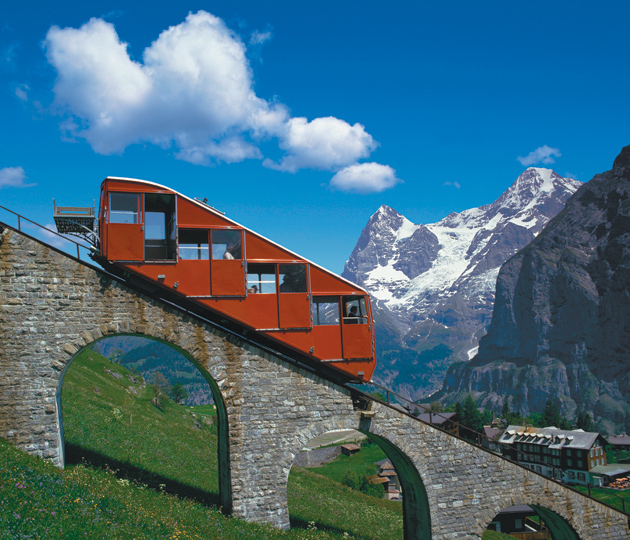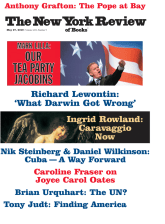One is not supposed to love Switzerland. Expressing affection for the Swiss or their country is akin to confessing nostalgia for cigarette smoking or The Brady Bunch. It immediately brands you as someone at once unforgivably ignorant of the developments of the past thirty years and incurably conventional in the worst way. Whenever I blurt out my weakness for the place the young yawn politely, liberal colleagues look askance (“Don’t you know about the War?”), my family smiles indulgently: Oh, that again! I don’t care. I love Switzerland.
What are the objections? Well, Switzerland means mountains. But if it is Alps you want, the French have higher, you eat better in Italy, and snow comes cheaper in Austria. Most damning of all, people are friendlier in Germany. As for the Swiss themselves, “Brotherly love, five hundred years of democracy and peace, and what did they produce? The cuckoo clock.”
It gets worse. Switzerland did remarkably well out of World War II—trading with Berlin and laundering looted assets. It was the Swiss who urged Hitler to mark Jewish passports with a “J”—and who, in an embarrassing exercise in recidivist chauvinism, have just voted to ban minaret construction (in a country that has only four and where almost all resident Muslims are secular Bosnian refugees). Then there are the tax evaders, although it has never been clear to me just why what Swiss banks do in servicing a handful of wealthy foreign criminals is significantly worse than what Goldman Sachs has done with the proceeds of millions of honest US tax dollars.
So why do I like it? In the first place, the country has the virtues of its defects. Dull? To be sure. But dull can also translate as safe, tidy, clean. A few years ago I flew to Geneva with my younger son, then nine years old. Upon arrival, we descended to the railway station—one of those that the Swiss so boringly locate directly underneath their airports—and sat down in a café to await our train. “It’s so clean!” the little boy observed. And so it was: obtrusively pristine. Unremarkable, perhaps, if you come from Singapore or Liechtenstein—but not to a child raised on JFK and whose only experience of a European airport until then had been confined to the tatty shopping mall at Heathrow.
The Swiss are obsessed with cleanliness. Once, on a train out of Interlaken, I was upbraided by an elderly lady for briefly placing the outer edge of my left foot on the corner of the seat facing me. In England, where no one would have noticed or cared, I might well have been taken aback at such brazen interference. But in Switzerland I merely felt embarrassed at having broken such an obvious civic code—implicated as I was in a shared responsibility for public goods. It is irritating to be called to order by one’s fellow citizens, but in the long run their callous indifference does far more harm.
Switzerland is a striking instance of the possibilities—and, therefore, the benefits—of blended identities. By this I do not mean the mixture of languages (German, French, Italian, Romansch), or the striking—and often neglected—topographical variety. I mean contrast. Everything in Germany is efficient, so there is no variety to nourish the soul. Italy is unremittingly interesting: there is no relief. But Switzerland is full of contrasts: efficient but provincial; beautiful but bland; hospitable but charmless—at least to the foreigners on whom it depends for so much of its well-being.
The contrast that matters most is that between the fickle surface sheen and the steady depths below. A few summers ago I took a trip to the summit of the Klein Matterhorn, a popular glacier skiing resort above Zermatt. There on the sun-dappled slopes—decorating the benches of an absurdly expensive restaurant—assorted Italian floozettes in micro-kinis and fur booties were draped across hard-faced Russians helicoptered to the summit sporting the latest gear. Debbie Does Davos: Switzerland at its worst.
And then, as out of nowhere, there appeared around the corner three little old men: swathed in wool and leather, their ruddy, sensible-looking faces topped by sensible-looking hats. Hands firmly gripping stout climbing sticks, they plumped their substantial backsides onto a bench and unlaced their weathered boots. Sublimely indifferent to the dolce vita unfolding before them, the gnarled mountaineers congratulated one another in incomprehensible Switzerdeutsch on what must have been a grueling ascent—and, sweating profusely, ordered three beers from the cheerful, white-bodiced waitress: the good Switzerland.
During the 1950s, my parents and I took a number of trips to Switzerland. This was their brief parenthetical moment of prosperity, but in any case Switzerland then was not so very expensive. I think what struck me as a child was the uncluttered regularity of everything. We usually arrived via France, in those days a poor and run-down country. French village houses were still pockmarked with shell damage, their Dubonnet ads torn and crumbling. The food was good (even a London schoolboy could tell that) but the restaurants and hotels had a damp, tumble-down air to them: cheap and cheerless.
Advertisement
And then you crossed the border, always at some windswept, snow-drenched pass or summit…and entered a land of neat, flower-bedecked chalets, air-brushed streets, prosperous-looking shops, and smart, satisfied citizens. Switzerland seemed so untouched by the war that had just ended. Mine was a black-and-white childhood, but Switzerland came in color: red and white, brown and green, yellow and gold. And the hotels! The Swiss hotels of my childhood evoked fresh pine, as though they had sprung organically from the surrounding forests. There was warm, solid wood everywhere: thick wooden doors, padded wooden staircases, firm wooden beds, chirping wooden clocks.
The dining rooms had large picture windows, there were flowers and crisp white linens galore—and although this cannot be true, it seems to me as I think back that there was no one else around. I, of course, had never heard of Clavdia Chauchat; but in later years I would imagine her sweeping silently into one of those dining rooms, her dark eyes scanning the tables, while I—Castorp-like—silently entreated her to join me. In actuality, my companions were stolid-looking couples of a certain age: Switzerland lets you dream, but only so much.
Memory plays tricks. I know that we almost always spent our holidays in the Bernese Oberland: German-speaking Switzerland. Yet I associate the country fondly with my first stumbling efforts to speak French: choosing chocolate, asking directions, learning to ski. And buying tickets. Switzerland for me has always been about trains: their distinctive virtues seductively encapsulated in the little transport museum just outside Luzern. Here one learns of the first electric trains in the world; the first and most technically accomplished rail tunnels; the highest railways in Europe—culminating in the astonishing Jungfraujochbahn driven up through the heart of the Eiger and terminating at a permanent station 11,225 feet above sea level.
The Swiss, curiously, are never troubled by what British Rail used to call “the wrong kind of leaves”—or, indeed, the wrong kind of snow. Just as the little mountain men ascend the daunting Klein Matterhorn with an untroubled air, so the trains that their great-grandfathers built have for decades trundled effortlessly up and down from Brig to Zermatt, from Chur to St. Moritz, from Bex to Villars.
At Andermatt, the epicenter of the country where the Rhine and Rhône rivers surge icily out of their moun- tain fastness, the Milan–Zurich transalpini slice deep into the Gotthard mountains while hundreds of feet above them the Glacier Express cuts a series of terrifying switchback cog tracks on its vertiginous climb clear over the roof of Europe. It is hard enough to navigate these routes in a car, much less cycle or walk them. How on earth were they built? Who are these people?
My happiest memories are of Mürren. We first went there when I was eight years old: an unspoiled village halfway up the Schilthorn massif attainable only by rack railway or cable car. It takes forever—and a minimum of four trains—to reach the place, and there is little to do once you arrive. There is no particularly good food and the shopping is unexciting, to say the least.
The skiing, I am told, is good; the walking certainly is. The views—across a deep valley to the Jungfrau chain—are spectacular. The nearest thing to entertainment is the clockwork-like arrival and departure of the little single-carriage train that wends its way around the mountainside to the head of the funiculaire. The electric whoosh as it starts out of the tiny station and the reassuring clunk of the rails are the nearest thing to noise pollution in the village. With the last engine safely in its shed, the plateau falls silent.
In 2002, in the wake of an operation for cancer and a month of heavy radiation, I took my family back to Mürren. My sons, aged eight and six, seemed to me to experience the place just as I had, even though we stayed in a distinctly better class of hotel. They drank hot chocolate, clambered across open fields of mountain flowers and tiny waterfalls, stared moonstruck at the great Eiger—and reveled in the little railway. Unless I was very much mistaken, Mürren itself had not changed at all, and there was still nothing to do. Paradise.
Advertisement
I have never thought of myself as a rooted person. We are born by chance in one town rather than another and pass through various temporary homes in the course of our vagrant lives—at least that is how it has been for me. Most places hold mixed memories: I cannot think of Cambridge or Paris or Oxford or New York without recalling a kaleidoscope of encounters and experiences. How I remember them varies with my mood. But Mürren never changes. Nothing ever went wrong there.
There is a path of sorts that accom- panies Mürren’s pocket railway. Halfway along, a little café—the only stop on the line—serves the usual run of Swiss wayside fare. Ahead, the mountain falls steeply away into the rift valley below. Behind, you can clamber up to the summer barns with the cows and goats and shepherds. Or you can just wait for the next train: punctual, predictable, and precise to the second. Nothing happens: it is the happiest place in the world. We cannot choose where we start out in life, but we may finish where we will. I know where I shall be: going nowhere in particular on that little train, forever and ever.
—This piece is a part of a continuing series of memoirs by Tony Judt.
This Issue
May 27, 2010




